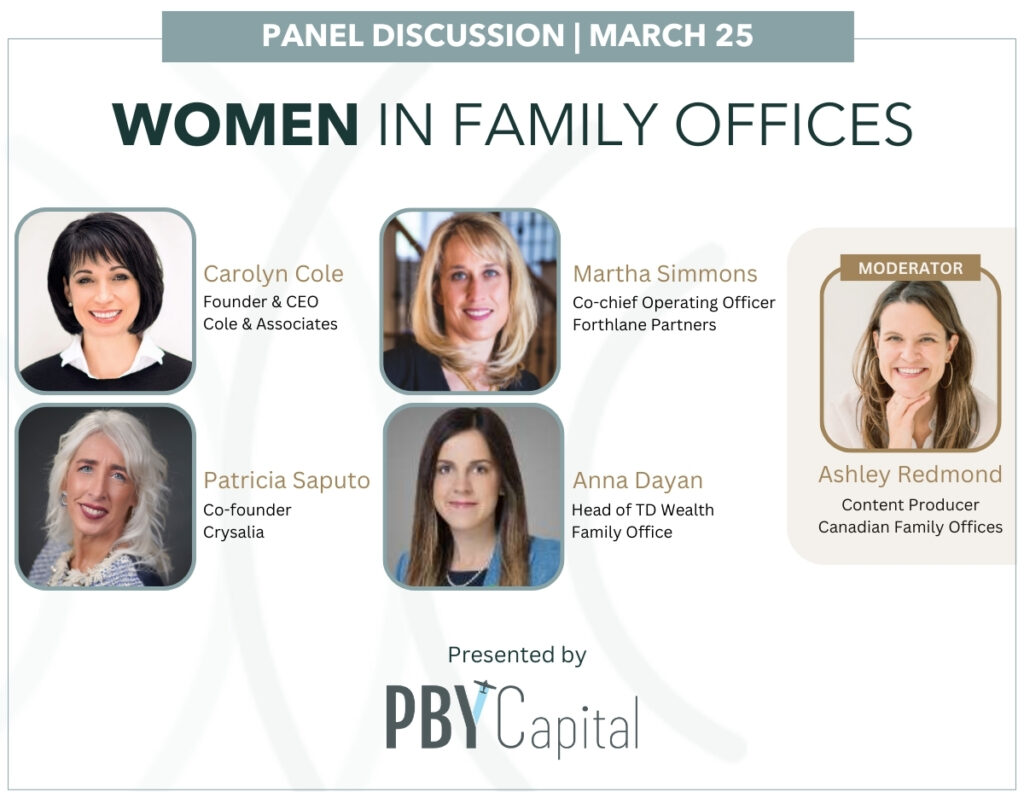“I am reminded every day, if not by events then by my wife, that I am not a perfect man.” — Barack Obama
Here at Canadian Family Offices, we tend to bandy about the phrase “Progress, not perfection” quite a bit. We find it to be a comforting and wise-sounding bromide. It reminds us that we do screw up, at least occasionally, and that the important task is to learn from mistakes and do what we can to set things right, while hoping all along that our errors do not prove fatal.
Into that category falls a recent “oversight” that occurred during our very successful online panel discussion about alternative investments, held on May 22.
Of course, the assembled experts—Christopher Foster, CEO, Foster & Associates; Dale Powell, Director, Investments, Citibank Private Wealth; Dan Riverso, CEO/CIO, Jesselton Capital Management; Robin Tessier, Partner and Head of Product & Solutions, Canada, Sagard—acquitted themselves admirably as they discussed the strengths, weaknesses, risks and opportunities in alts for family offices and other investors. (If you didn’t get a chance to attend the panel live, we encourage you to watch the recap here.) The trouble, however, was that time constraints (or questionable time management) meant that the moderator did not take the opportunity to raise the questions our attendees had offered up before the panel began. That is a problem, not only because we like to get our audience involved as much as possible in these discussions, but also because some of their questions in this case were so good.
So, in part to make amends and in part to give more context to our Special Report on Alternatives last month, we went back to our panelists for their thoughts on a selection of reader questions that we neglected to air during the May 22 event. Below are their responses. We hope that you will find them as engaging and informative as we do. And we hope that you will forgive us.
When do alternative investments do best? When do alternative investments do poorly?
Christopher Foster, Foster & Associates: What alternatives do best is moderate volatility. Thirty per cent-plus swings in equity markets are too much for families to withstand in normal circumstances. It plays havoc with their commitment to long-term planning and it takes a psychological toll on family members. This should not be trivialized.
How do you think about geographic exposure in your private equity strategy? Do you see U.S. exposure as a pro or a con in this environment?
Dale Powell, Citibank Private Wealth: As with all investments, geographic diversification is important and we do look at opportunities outside the U.S., in many cases because of valuation—private equity is less well-travelled in other parts of the world outside. That said, just as I don’t believe in single-country investing for equity markets, for instance, I also don’t believe that should be the case for private equity investments, either. The reality, though, is that the PE industry is, we find, much more advanced and accepted as part of the opportunity set for investors in the United States than it is in other parts of the world. So, should you look at geographic diversification? Certainly, but not just for the sake of being geographically diverse.
Dan Riverso, Jesselton Capital Management: Similar to a public equity allocation, private equity should also be diversified. U.S. exposure should be maintained, given the size of the U.S. economy and number of opportunities. As to whether it is a pro or con, it depends on the industry—and the eventual impact of tariffs.
Do you prefer investing directly in companies or through private equity funds? What are the pros and cons of each approach from a family office perspective?
Powell: Direct investment can work very well for family offices who probably already have an allocation to direct privates and thus understand the space, and/or have in-house expert staff with the experience and influence to source and fully understand opportunities. It can also work well for family offices looking to customize a PE portfolio beyond a fund. I think the cons are the flip side of the pros: a family office needs in-house expertise in order to evaluate and source opportunities, as well as a network available to them in order to potentially aid with a liquidity event. (The liquidity expected should be zero at any given time). And finally, deals size in direct investment may be relatively small and so may not ‘move the needle’ for a large family office.
Riverso: In my experience as a single investment professional at a family office, I prefer a diversified allocation to funds. They can be easier to manage, and you can access already diversified strategies. The con is facilitating capital calls—moving money between accounts, planning ahead for calls so that capital is not sitting idle. Going direct, you have more control over the companies and can add value (if in a related industry to the family office), but the workload may be higher, especially if you want a diversified allocation. For example, you can invest in a fund with 10 underlying investments, or you can invest directly in 10 companies. The efficiency of a fund also comes with fees. Lastly, and perhaps most importantly, if you do not have deal flow, it will be very difficult to build out a diversified portfolio of direct investments.
What do alternative investments do poorly?
Foster: I would say their commitment to governance best practices is the most disappointing thing I have discovered in my years of due diligence into the space. How they deal with moral hazard and conflicts of interest is something that lags way behind the best boardroom standards, even though the financial impact on investors is just as serious, if not more so.
How do you think the adoption of artificial intelligence will simplify the investment process for family offices?
Riverso: AI will aid in due diligence, in reviewing material and conducting background checks. An AI tied into performance measurement software may also be of value and assist with portfolio management and monitoring. Overall, it will allow a family office investment professional to do more, which is a positive as many teams are very lean. Having said that, the AI must be reliable.
Why do investment houses charge more for alternative investments? Is this justified?
Foster: I assume the writer is referring to fund manufacturers, not the investment dealers that may place them in client portfolios. I think this phenomenon is most prevalent in alpha-generating strategies (i.e., hedge funds) and I agree they are overpriced. That said, I sympathize with the fund managers in that one never knows how long an alpha-generating strategy is going to be able to continue to make money, so in the mind of the portfolio manager, they had better make money while the sun shines! It’s a matter of time before their advantage gets arbitraged out, they start trying to deploy too much money in the strategy, or the market structure changes in a way that makes it difficult to implement their strategy.
Get our new quarterly newsletter about philanthropy: Canadian Family Offices’ new newsletter brings you key insights, trends and expert perspectives on charitable giving, tailored to Canada’s wealth leaders and giving communities. Click here to subscribe now to stay ahead.
Please visit here to see information about our standards of journalistic excellence.




